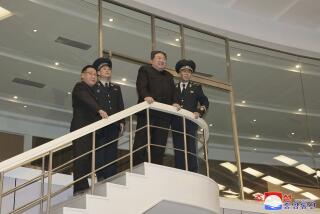Crack in N. Korea’s Door
- Share via
Won-again, off-again effort to steer North Korea away from making nuclear weapons and onto the path of greater engagement appears to be on again, at least for now. This week Pyongyang agreed to let U.S. specialists visit a mysterious subterranean project that its army is building in a remote mountainous area called Kumchangri. The United States suspects the site might be intended for clandestine nuclear weapons work.
In return for the inspections--though the Clinton administration insists that no quid pro quo is involved--North Korea will get more U.S. food aid and help in setting up potato farms. These efforts are meant to alleviate the destructive famine that might already have taken more than 2 million lives and stunted the physical and mental development of millions of children. Koreans have little taste for potatoes, but the idea for large-scale potato farming seems to have come from Kim Jong Il, the maximum leader. The cost of the U.S. aid will be considerably less than the $300 million that Pyongyang earlier demanded for a peek into its hollowed-out mountain.
The first American inspection is scheduled for May, with another one a year later and then, according to the State Department, as many as might be needed to show that North Korea is not running a clandestine nuclear weapons program. But confidence in the durability of this agreement should be reserved.
In 1994, with concerns rising that North Korea was within months of producing nuclear weapons at its main Yongbyon nuclear facility, Washington got South Korea and Japan to agree to pay for two modern reactors to provide North Korea with electricity, while the United States on its part promised to supply 500,000 metric tons of fuel oil a year. In return, North Korea promised to freeze its nuclear program, and Yongbyon was opened to monitoring by the International Atomic Energy Agency.
But the existence of the Kumchangri site and concerns that North Korea might be hiding other secret nuclear facilities, plus Pyongyang’s continuing development of long-range missiles that are of little use except as delivery vehicles for nuclear warheads, inescapably feed suspicions about its fidelity to agreements and its intentions. Diplomats who have to deal with the world’s most reclusive and unpredictable regime often admit bafflement over the mind-set they encounter. With Pyongyang, skepticism is necessarily in order.
More to Read
Sign up for Essential California
The most important California stories and recommendations in your inbox every morning.
You may occasionally receive promotional content from the Los Angeles Times.










